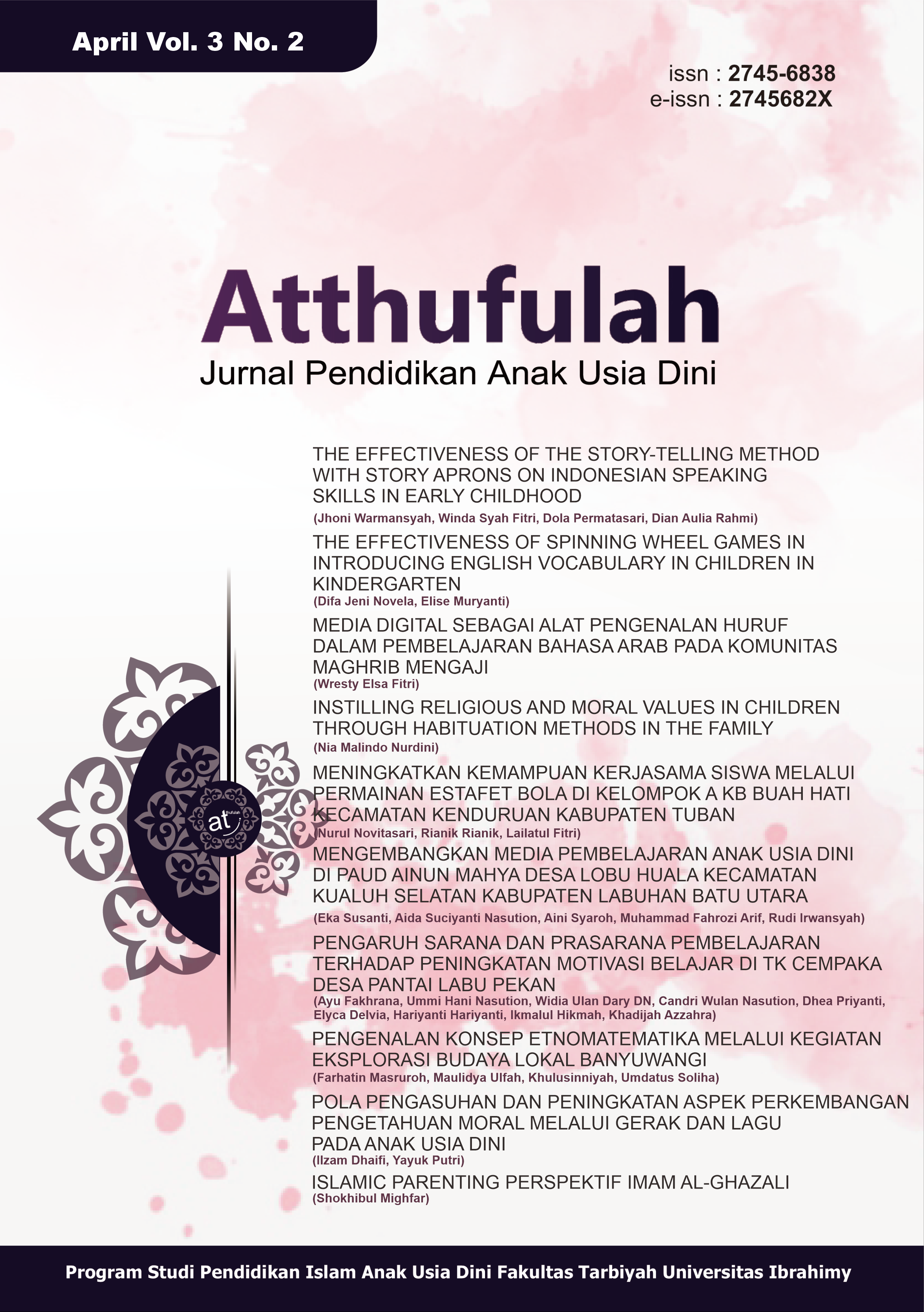ISLAMIC PARENTING PERSPEKTIF IMAM AL-GHAZALI
DOI:
https://doi.org/10.35316/atthufulah.v3i2.2972Keywords:
Parenting, Religious Value, Compassion, Exemplary, Communication, Holistic Education, Noble characterAbstract
This article discusses parenting from the perspective of Al Ghazali, a prominent Muslim scholar. The purpose of this article is to explain the principles emphasized by Al Ghazali in raising children wisely and based on Islamic values. Al Ghazali views the importance of raising children with compassion, wisdom, and religious values. Al Ghazali stressed that children are a gift and a mandate from Allah SWT which must be respected and taken care of properly. One of the principles emphasized is the importance of instilling religious and moral values in children from an early age, including ethics and noble character. In addition, Al Ghazali emphasized the importance of being exemplary in upbringing. Parents must set a good example for their children by showing behavior that is in accordance with religious values and morality. Children tend to imitate what they see from their parents, therefore it is the responsibility of parents to set a good role model in all aspects of life. Good communication between parents and children is also very important. Parents should listen attentively and empathetically and provide needed support and guidance. Good listening helps understand children's feelings and needs and gives them a sense of security and understanding. This article also underscores the importance of avoiding emotional neglect of children. Parents must provide attention, affection, and acknowledgment of their children's feelings and needs. They must be sensitive to children's emotions, provide the necessary emotional support and help them manage their emotions wisely. Ghazali's parenting approach emphasizes the importance of providing holistic education to children. Al Ghazali's perspective on parenting emphasizes the importance of raising children with love, example, good communication, and holistic education. These principles help form children who have noble and quality morals. This article provides valuable insights for parents in carrying out their duties in raising children according to Al Ghazali's perspective.
References
Abidin Ibnu Rush. (1997). Pemikiran Al-Ghazali Tentang Pendidikan. Gaya Media Pratama.
Abu Hamid Muhammad bin Muhammad Al-Ghazali. (1997). Ayyuhal Walad, (Kiat Sukses Mendidik Anak Shaleh), Diterjemahkan A. Ma’ruf Asrori, Adib Muchtari. Dunia Ilmu Offset.
Abu Hamid Muhammad bin Muhammad Al-Ghazali. (2006). Ayyuhal Walad (p. 19). Al-Haramain.
Abu Muhammad Iqbal. (2015). Pemikiran Pendidikan Islam: Gagasan-Gagasan Besar Para Ilmuwan Muslim. Pustaka Pelajar.
Abuddin Nata. (2000). Pemikiran Para Tokoh Pendidikan Islam (ke-1). PT. Raja Grafindo Persada.
Adian Husaini. (2006). Hegemoni Kristen-Barat dalam Studi Islam di Perguruan Tinggi. Gema Insani Press.
Ahmad Zaini. (2016). Pemikiran Tasawuf Imam al-Ghazali. Esoterik: Jurnal Akhlak Dan Tasawuf, Vol 2(1), 146–159. http://dx.doi.org/10.21043/esoterik.v2i1.1902
Al-Ghazali, I. (2008). Ringkasan ihya’ulumuddin. Akbar Media.
Al-Jauziyah, I. Q. (2000). Tuhfatul Mawdud bi Ahkam al-Mawlud. Dar al-Kitab al-Araby.
Al-Thridonanto. (2014). Mengembangkan Pola Asuh Demokratis. Elex Media Computindoi.
Ali Al Jumbulati. (1994). Perbandingan Pendidikan Islam. PT. Renika Cipta.
Aryani, N. (2009). Pengantar Psikologi Anak. PT. Remaja Rosdakarya.
Bowlby, J. (1982). Attachment and loss: Retrospect and prospect. American Journal of Orthopsychiatry, 52 (4), 664–678. https://psycnet.apa.org/doi/10.1111/j.1939-0025.1982.tb01456.x
Christian D. Von Dehsen. (1999). Philosophers and Religious Leaders. Lives and Legacies. Greenwood Publishing Group, 2, 75.
Chusnul Muali. (2017). Rasionalitas Konsepsi Budaya Nusantara dalam Menggagas Pendidikan Karakter Bangsa Multikultural. Jurnal Islam Nusantara, 1 No. 1, 105–117. https://doi.org/10.33852/jurnalin.v1i1.64
Diana Baumrind. (1967). Child Care Practices Anteceding Three Patterns of Preschool Behavior, Genetic Psychology Monographs.
Fathiyyah Hasan Sulaiman. (1986). Alam Pikiran Al Ghazali Mengenai Pendidikan dan Ilmu (Cet. Ke-1). CV. Diponegoro.
Frank Griffel, Edward N. Zalta, ed. (2016). The Stanford Encyclopedia of Philosophy (Ke-Winter). Metaphysics Research Lab, Stanford University.
Gerhard Böwering, Patricia Crone, Mahan Mirza, Wadad Kadi, Muhammad Qasim Zaman, D. J. S. (2013). The Princeton Encyclopedia of Islamic Political Thought. Princeton University Press.
Hamdani Ihsan dan Fuad Ihsan. (2007). Filsafat Pendidikan Ilsam. CV. Pustaka Setia.
Imam Bukhari. (1992). Shahihul Bukhari, terj. Zainuddin Hamidi (Jilid I Ce). Widjaya.
Koesmarwanti dan Nugroho Widiyanto. (2002). Dakwah Sekolah di Era Baru. Intermedia.
Kurang perhatian orangtua, anak-anak di Kendari jadi penjahat. (2014). Merdeka.Com.
Mahmud. (2011). Pemikiran Pendidikan Islam. CV Pustaka Setia.
Mahmud Yunus. (2009). Orang Tua Yang Baik: Konsep dan Aplikasinya. Erlangga.
Margareth Smith, A. (2000). Pemikiran dan Doktrin Mistis Imam Al-Ghazali (cet. 1). Riora Cipta.
Mirroh Fikriyati. (2013). Perkembangan Anak Usia Emas (Golden Age). Laras Media Prima.
Muhammad bin Isa at-Tirmidzi. (n.d.). Sunan at-Tirmidzi. Dar Ibn Jauzi.
Muhammad Nur Abdul Hafidz Suwaid. (2010). Prophetic Parenting Cara Nabi Mendidik Anak. Pro-U Media.
Muzayyin Arifin. (2010). Filsafat Pendidikan Islam. PT. Bumi Aksara.
Pamungkas, T. (2018). Keluarga dan Tumbuh Kembang Anak, Sukses Mendidik Anak di Abad 21. Samudra Biru.
Pasal 1 angka 1 UU nomor 35 tahun 2014 tentang Perubahan atas Undang-Undang Nomor 23 Tahun 2002 Tentang Perlindungan Anak. (2014).
Pasal 1 angka 2 PP nomor 44 tahun 2017 tentang Pelaksanaan Pengasuhan Anak. (2017).
Pasal 2 angka a dan b PP nomor 44 tahun 2017 tentang Pelaksanaan Pengasuhan Anak. (2017).
Pasal 26 ayat (1) huruf a,b,c dan d, UU nomor 35 tahun 2014 tentang Perubahan atas Undang-Undang Nomor 23 Tahun 2002 Tentang Perlindungan Anak. (2014).
Praja, J., & Supriadi, D. (2013). Pengantar Filsafat Islam. Bandung: CV. Pustaka Setia. Sunarya, Yaya.
Saiful Falah. (2014). Parents Power “Membangun karakter Anak melalui Pendidikan Keluarga. Republika.
Shihab, M. Q. (2009). Tafsir Al-Misbah. Lentera Hati.
Sukarno Hadi. (2019). Studi Kasus pada Siswa yang Kurang Mendapat Perhatian Orang Tua pada SMK. Jurnal Konseling Pendidikan, Vol. 3(2).
Syamsul Kurniawan. (2016). Pendidikan Karakter. Ar-Ruzz Media.
Tamara Sonn. (1996). Interpreting Islam: Bandali Jawzi’s Islamic Intellectual History. Oxford University Press.
UU Nomor 35 Tahun 2014 Tentang Perubahan atas Undang-Undang Nomor 23 Tahun 2002 Tentang Perlindungan Anak. (2014).




















_by_Matematohir.jpg)

